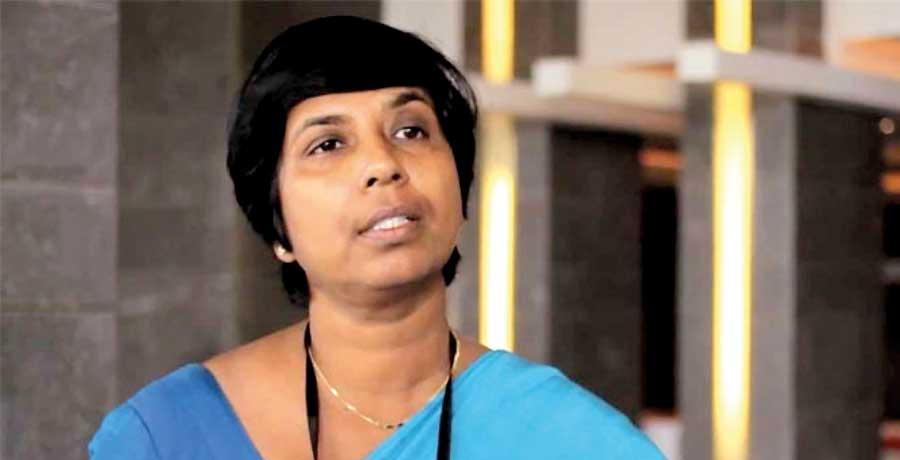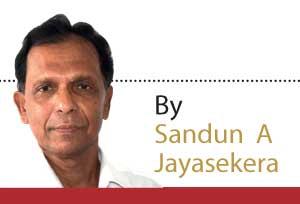05 May 2021 - {{hitsCtrl.values.hits}}

The COVID-19 has affected Sri Lanka’s health sector, the national economy and most industries while totally disrupting the way of life of all Sri Lankans like many other nations. The Daily Mirror discussed the present situation regarding the unprecedented health threat and its future impact on the country with State Minister of Primary Health Care, Epidemics and COVID Disease Control Dr. Sudarshini Fernandopulle.
totally disrupting the way of life of all Sri Lankans like many other nations. The Daily Mirror discussed the present situation regarding the unprecedented health threat and its future impact on the country with State Minister of Primary Health Care, Epidemics and COVID Disease Control Dr. Sudarshini Fernandopulle.
Following are excerpts of the interview:
 Q Is COVID-19 going to remain in Sri Lanka forever?
Q Is COVID-19 going to remain in Sri Lanka forever?
It is going to remain not only in Sri Lanka, but globally for a considerable period of time until all countries are able to vaccinate their population aged 18 and above.
Q Does that mean the Corona virus might never disappear and there is a high possibility that it is becoming an endemic disease in Sri Lanka like dengue, leptospirosis or Chikungunya?
It’s a possibility. Unlike the diseases mentioned the Corona virus keeps on mutating and as a result it could cause periodic episodes of infections. However it is too early to comment about how it would behave.
Q In that case when would Sri Lanka successfully control COVID- 19 to a manageable level?
It’s difficult to comment, but if we can vaccinate all our eligible population we could reduce the risk of transmission, severity of the disease and mortality. However we should continue to wear masks, maintain social distancing and practise respiratory etiquette.
Q However, the biggest challenge right now is the dying of people as a result of blood clots forming in their system after the first jab of the AstraZeneca vaccine and the sudden spike of the pandemic after the New Year celebrations. Do you agree?
It’s a rare observation seen among a very few individuals within 4 to 20 days after the vaccination, but a definite link to the vaccine has not been established yet either here in Sri Lanka or globally. The benefit of the vaccination in reducing mortality due to Covid is much higher than the complications due to the vaccine. Therefore it is better to get the vaccination, but in the UK those below 30 years are not advised to get the AstraZeneca vaccination because the risk of complications after the vaccination is higher than the risk of dying due to the COVID-19 infection.
Q There is no argument that Sri Lanka has managed this viral infection satisfactorily when comparisons are made with other countries, based on the number of patients and deaths. What or who is the main contributor to this positive development?
Team work. Leadership at the highest level given by President Gotabaya Rajapaksa, regular monitoring and the review of the Covid situation, the multidisciplinary approach where the health sector was strongly supported by the Triforces and police, Free health services and a good public health infrastructure are the highlights..
Q We have an excellent National Immunization Programme (NIP) that has helped Sri Lanka to maintain an exceptional free healthcare delivery system covering the entire nation from the womb to the tomb. What is the NIP’s contribution to keep COVID-19 at bay?
As I mentioned above to vaccinate all those above 18 years of age.
Q It’s understandable when you say that inoculation against COVID- 19 is mandatory for all those who are over 60 years of age. But what is the rationale of vaccinating only those above 30 years of age in a scenario where a fair number of youth below 30 years of age have succumbed to complications related to the pandemic?
Although the WHO and International guidelines specify to give priority to those aged 60 years and above we vaccinated those who are 30 years and above because in Sri Lanka during the second wave we observed that the majority of those infected were between 30 to 60 years and this is the group which is engaged in economic activities. Only 10% were above 60 years. After we vaccinate this group we will consider vaccinating those 18 years and above.
Q Could your ministry which is tasked with the responsibility of saving the nation from COVID- 19 complete the inoculation of the entire target group?
It’s difficult to say because of the issues connected to the supply of vaccines. We had anticipated regular supplies of
AstraZeneca from the Serum Institute as well as through COVAX facility which again depends on the Serum institute for supplies. The unanticipated high Covid infections in India has put us in a difficult position. We are short of approximately 600,000 doses of the vaccine to complete the second dose. The Government has ordered 13 million doses of Sputnik 5 and signed an agreement with Pfizer for 5million doses.
Q How has this new challenge affected Sri Lanka’s free healthcare delivery system?
Again we are seeing a rapid rise in the cases especially with the new variant identified.
Q Why did the Government give the nod to import 600,000 Sinopharm vaccines from China without the approval of the WHO and the National Medicine Regulatory Authority (NMRA)?
It was a donation sent by China and NMRA gave the approval to accept the donation. We are awaiting approval which I believe would be given very soon.
Q The removal of four highly qualified members including the chairman of the NMRA has created controversy and sparked protests featuring by the medical fraternity, the public and the opposition. Why did the Government remove them without any valid reason and violating the NMRA Act?
I personally respect and thank all those esteemed members who did a great service to the country and I firmly believe that the NMRA should be an independent body as it has a great responsibility in ensuring the quality, safety and efficacy of drugs and vaccines.
Q Don’t you think the removal of these professionals, who have been doing a solid job at the NMRA, has put the public health at risk?
I agree that they did a great job, but you have to realise that these are temporary appointments and the Hon. Minister has the powers to appoint new members.
Q Former Director General of Health Services (DGHS) Dr. Anil Jasinghe, a highly efficient and respected medical professional, did a wonderful job to successfully control the Covid virus when the pandemic hit the country for the first time, last year. The Government, instead of giving him more responsibility to tackle this unprecedented health threat, kicked him upstairs as the Secretary of the Ministry of Environment and failed to get his services to control the second and third waves of the pandemic. Why?
I agree with you that he did a great service. The control of COVID- 19 is always a collective team effort and he offered solid leadership to the Ministry of Health during the first wave taking quick decisions. I believe that he was promoted because of his contributions.
09 Jan 2025 31 minute ago
09 Jan 2025 56 minute ago
09 Jan 2025 2 hours ago
09 Jan 2025 2 hours ago
09 Jan 2025 2 hours ago